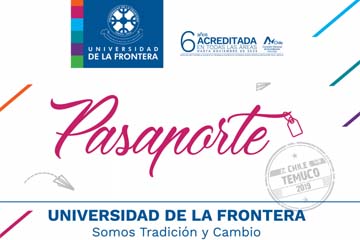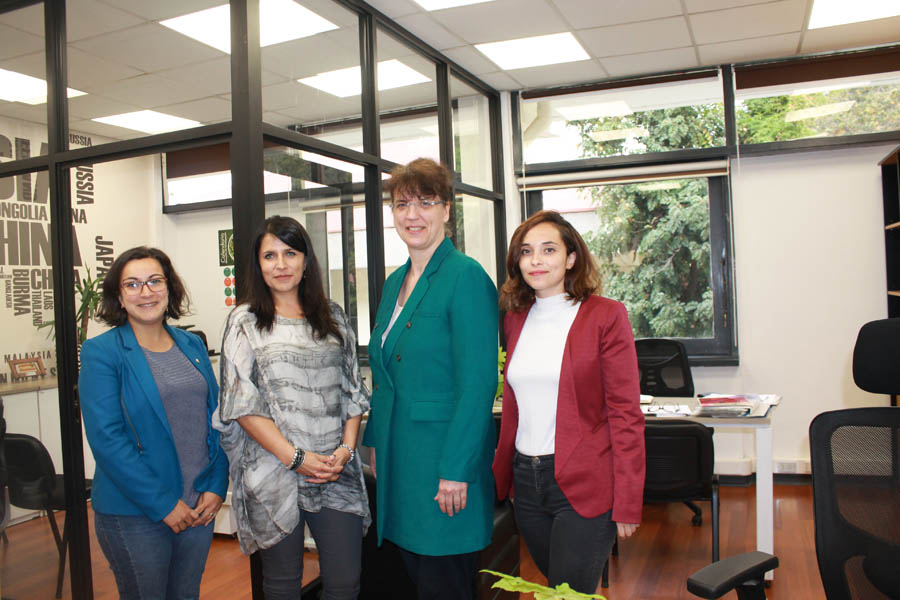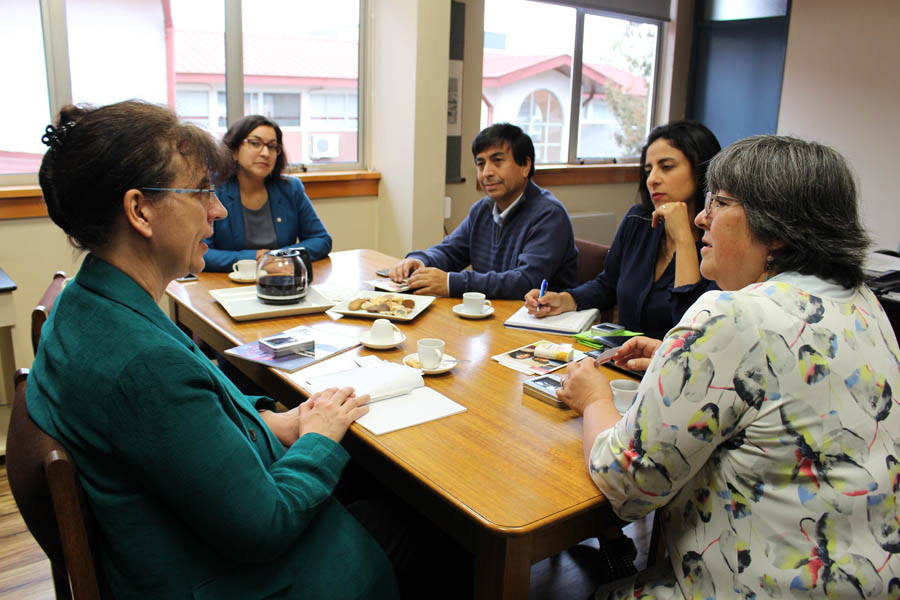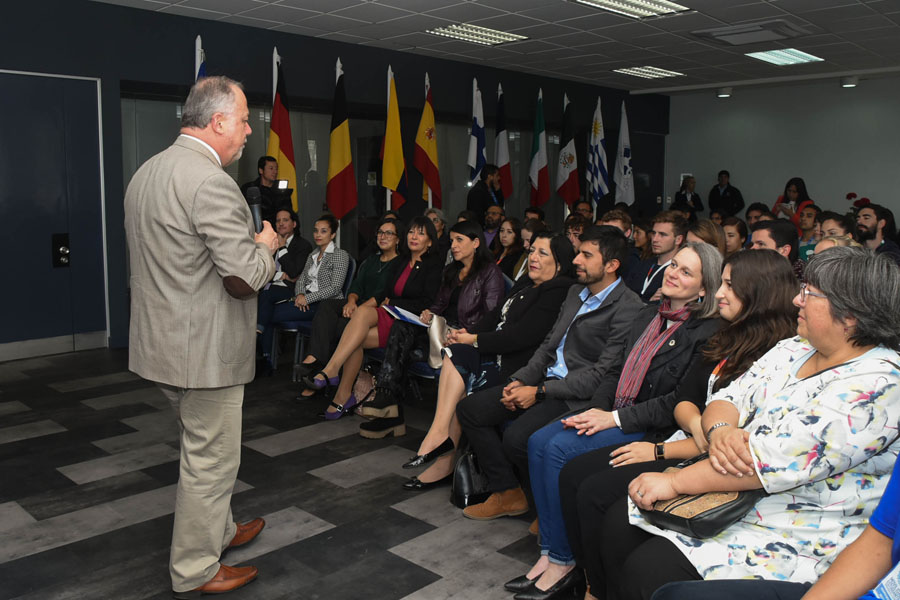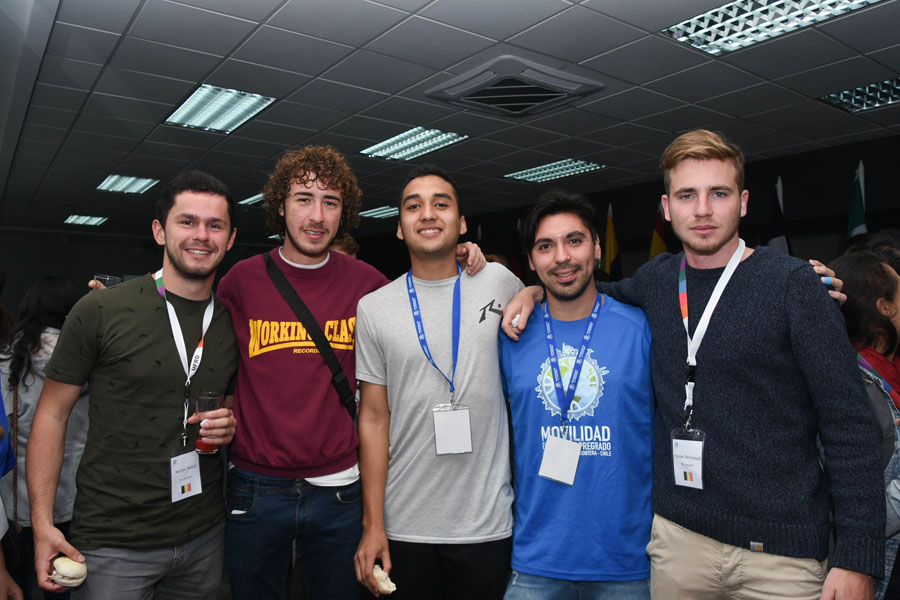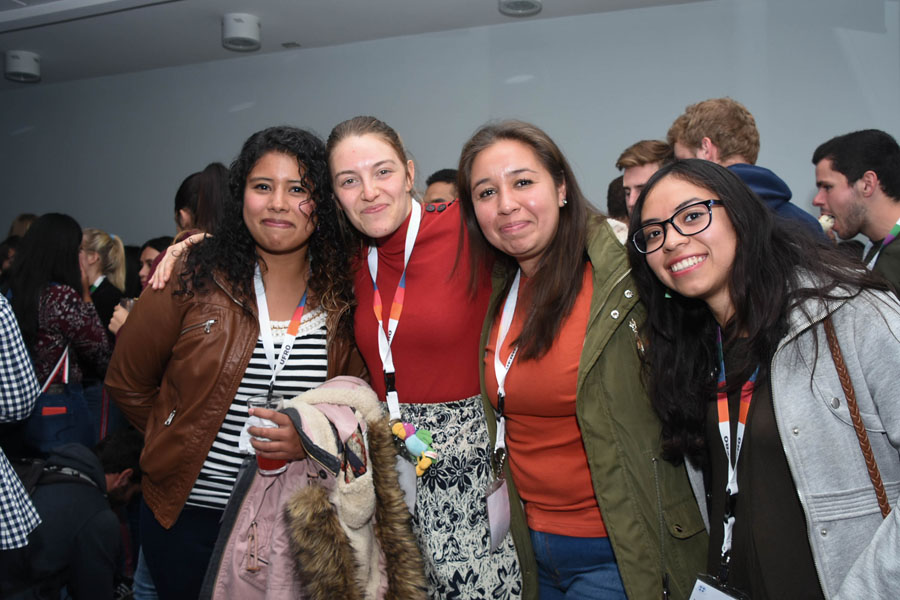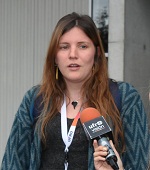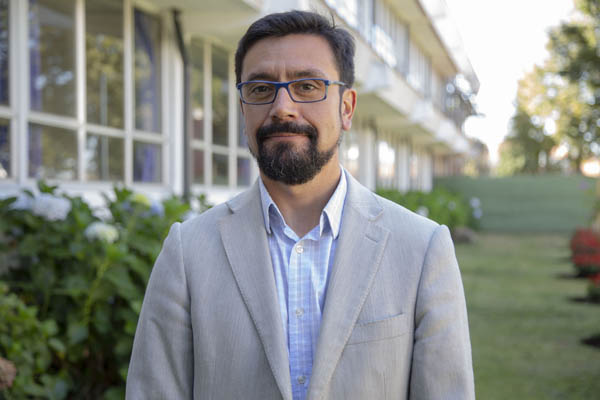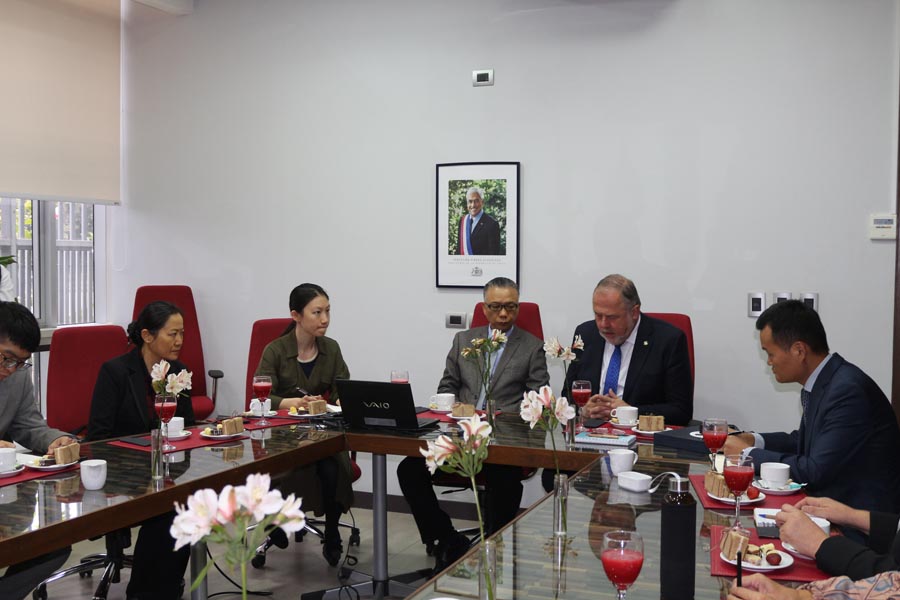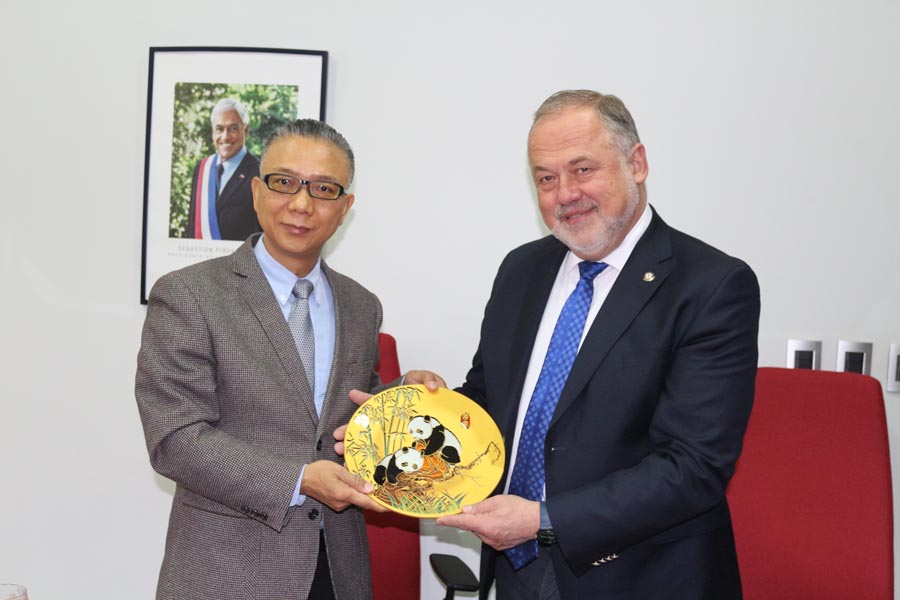|
|
The Rector´s Office and the Department of Analysis and Institutional Development created and designed the “UFRO Passport”, a brochure academics, researchers and students can use whenever they need to present our achievements and the essence of the daily work of our university. It is available as a hard copy or as a digital download, in Spanish and English.
 Written by: The Rector’s Office, Written by: The Rector’s Office,Department of Analysis and Institutional Developmente |
|
The director of the International Affairs Office of the Universidad de La Frontera and the director of the International Office of the Technical University Braunschweig came together to sign a specific agreement between both institutions. |
About 12500 students are part of the Technical University Braunschweig (TU Braunschweig). It is one of the oldest technical universities in Germany and member of TU9, the Alliance of Leading Universities of Technology in Germany. During her trip to Chile, the director of the International Office of TU Braunschweig, Dr. Ute Kopka, visited five institutions for higher education with which they cooperate, and the Universidad de La Frontera is one of them, since the universities have a mutual framework agreement since 2016. “We are visiting the German Schools and institutions we cooperate with, because we want to increase the number of incoming students for our undergraduate programs in education and to open new possibilities for the exchange of students and academics,” she said. Although this has been a reality for the UFRO for several years, the incorporation of German researchers in the graduate programs and the creation of different possibilities for the mobility of undergraduate students, as well as the growing number of partnerships permitted an important development. This is a specific agreement that strengthens both institutions in this field. “At the moment we have a university teacher at our university who is working in the field of food chemistry and doing research in antioxidants. On other occasions we received Chilean students through the DAAD scholarship program, so we already have experience in this field and the confidence to go on,” the representative of the TU Braunschweig said. Berta Schnettler, the director of the International Affairs Office of the Universidad de La Frontera, thinks that strengthening cooperation strategies that are transversal and holistic gives real sense to the internationalization work of the UFRO. “Our purpose is to strengthen international links through the faculties, our nuclei and the postgraduate programs. And now, we also have the extension of this agreement in order to meet our goal.” NUCLEI AND FACULTIES During her visit, Dr. Kopka had several meetings at the Faculty of Education, Social Science and Humanities, the Faculty of Engineering and Science and the Scientific and Technological Bioresource Nucleus (BIOREN). The German university mentions four pillars that are essential for its development: teaching, knowledge, technology transfer and research. Juan Manuel Fierro, the dean of the Faculty of Education, Social Science and Humanities, said: “Although this German university is a technical university, their programs in the field of education are very similar to ours.” This is why the cooperation regarding methodological and academic aspects and student mobility is an important opportunity. At the Faculty of Engineering and Science Dr. Kopka was received by the vice dean, Elena Oliveros, the director of the Outreach and Community Engagement Office of the faculty, Iván Velásquez, and the coordinator for internships, Gabriela Reyes. “It is essential for us to strengthen these links, since one of the main objectives of our Plan for Strategic Development is internationalization,” the dean claimed. In this context, Gabriela Reyes commented: “We want the number of students who have the opportunity to life an experience of student mobility (student exchange and internships) to grow and the TU Braunschweig offers an excellent opportunity, since their faculties are linked to the fields of engineering, computer science, mechanics, electricity and electronics.”  Written by: UFRO Communications Office Written by: UFRO Communications OfficeThis email address is being protected from spambots. You need JavaScript enabled to view it. |
|
The students come from Germany, Belgium, Colombia, Spain, Finland, France, Italy, Mexico and Uruguay and will now be part of the UFRO University Community, thanks to the work of the International Affairs Office in cooperation with the faculties, centers and institutes. Also two national students from universities of the Consortium of Universities in Chile (CUECH) are going to join the UFRO. |
The Rector, Dr. Eduardo Hebel, together with other university authorities of the Universidad de La Frontera welcomed the 53 foreign students who are joining the university for their undergraduate studies this semester and appreciated this part of the process of internationalization, which is essential for the development and progress of the university. “We are happy and proud that they chose this university out of the wide range of national universities. And the fact that the incoming students are from the best 100 universities worldwide shows that we are doing things right,” the university authority said. Part of the welcome ceremony was the official incorporation of the new students who will mostly stay for one semester and who will also turn into ambassadors for the international alliances the UFRO has been establishing with its foreign peers – in this case especially with prestigious institutions in Germany, Belgium, Colombia, Spain, Finland, France, Italy, Mexico and Uruguay. The director of the International Affairs Office, Dr. Berta Schnettler, said: “This is essential and our university knows that the support of student mobility does not only bring benefits for the students who come to our university to get to know our culture but also for our local students who can acquire new knowledge and new learning experiences from an international point of view.” In the context of internationalization, which the Universidad de La Frontera is actively supporting with different initiatives and strategic programs, Dr. Schnettler assured that the International Affairs Office is focused on providing new opportunities through scholarship programs and on consolidating new networks to support academics, researchers, and undergraduate and postgraduate students. For the support of the new students during their integration process, the university organized a network of collaborating students (local students of the different UFRO undergraduate programs who volunteer to help the new incoming students with their adaptation), who are going to be their sponsors during this initial phase. Antonia Espinoza, who is in charge of the National and International Student Mobility Unit of the Universidad de La Frontera, explained that, since 2010, the institutional efforts brought more than 500 foreign students to our university. All of this is possible thanks to the different agreements for international cooperation and student mobility.
 Written by: UFRO Communications Office Written by: UFRO Communications OfficeThis email address is being protected from spambots. You need JavaScript enabled to view it. |
|
Research performance, innovation outputs and societal impact are the three different sets of indicators the SCImago Institutions Rankings evaluate for the international ranking of academic and research-related institutions. |
It is the most prestigious indicator for scientific productivity at the international level. SCImago published its ranking 2019 and ranks the Universidad de La Frontera in 7th place at the national level and in 41th place in Latin America. Regarding 2018, our institution for higher education climbed 5 positions at the national level and in the Latin American ranking it climbed 18 positions, thanks to the processes of constant improvement which the Universidad de La Frontera included in its institutional development plans and which were also one of the facts that led to the new accreditation last year, for 6 years in all areas. For Dr. Renato Hunter, the Vice-Rector for Research and Graduate Studies, one of the main factors for the good position of the Universidad de La Frontera during this last decade was its research performance, what leads to new challenges. “We need to establish a vision that focuses on the future regarding our indicators, especially when it comes to better mechanisms of internationalization and cooperation and, at the same time, to the networks that drive us towards state of the art scientific and technological development at the international level,” he said. The SCImago Institutions Rankings analyze 12 objective variables combined in three different sets of indicators: Research performance (50%), innovation outputs (30%) and societal impact (20%). This year, more than six thousand universities and research centers all over the world have been evaluated. To see the rankings, please go to: https://www.scimagoir.com/rankings.php.  Written by: Vice-Rectorate for Research and Graduate Studies Written by: Vice-Rectorate for Research and Graduate Studies |
|
The ambassador Xu Bu visited the Universidad de La Frontera in order to talk with the university authorities about future alliances and cooperation. |
He is one of the most important persons in Chile at this moment. He is a Doctor of Law and has had an impressive trajectory. He has been Minister-Counsellor and has a great reputation because of his work as an ambassador through which he managed to create new commercial alliances between China and Chile that are worth more than 64 billion dollars. He appreciates the arrival of Tianqi (a Chinese company with high influence, dedicated to lithium) at SQM and has extraordinary political skills. It is not a coincidence that his official position is Ambassador Extraordinary and Plenipotentiary of the People's Republic of China to Chile. Now, he came to the Universidad de La Frontera in order to talk with the university authorities about future alliances and cooperation. According to the work agenda of the ambassador the rapprochement between both countries is not only taking place on the economic level, but also on the cultural and social level. “In November this year, the President of China is going to visit Chile to celebrate 50 years of diplomatic relations. Chile was the first country in South America to start this relationship and today, the country is one of our most important business partners, with exportations worth more than 43 billion dollars. A big part of Chile’s exportations go to China,” Xu Bu commented. And since this is not only about business, the ambassador as well as the authorities of different universities are strengthening their links, as it is the case of the Universidad de La Frontera, which wants to intensify the relations that already exist with China in order to strengthen and make further progress in the fields of research that distinguish this university from others. “We know that the Universidad de La Frontera is one of the most important universities in the south of Chile. And we believe that it is important to strengthen our cultural links through our students,” the ambassador added. Actually, one of the envisioned possibilities is the establishment of the Confucius Institute at the UFRO and the continuation of student exchange between Chile and China for language acquisition, postgraduate studies or other educational and cultural activities. “Even though our business relations are very stable, cultural cooperation is getting more and more important. We want to encourage Chinese cultural groups to come to Chile and if there are local cultural groups that want to show their talent in China, we can support them,” the ambassador pointed out.
|





